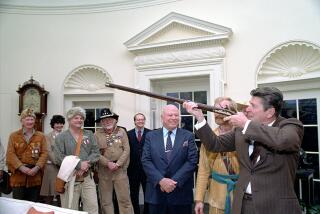Excerpts: The New World Force Is Economic Power
- Share via
Following are excerpts from the report, “American Agenda,” that former Presidents Gerald R. Ford and Jimmy Carter presented to President-elect George Bush on Monday:
Overview: The bipolar world of the post-World War II era, with two dominant superpowers and largely subservient allies, is gone. A new world is emerging with multiple centers of power. . . . The U.S.S.R. is on the defensive within its own empire. Nationalism is reasserting itself inside the borders of the Soviet Union, while the Poles, the Czechs and the people of other Soviet Bloc countries are pressing for greater independence. . . . Communism is in political disarray; the old simple and straightforward threat posed by a unified and expansionist Communist world under Soviet command has abated for now. . . .
The new force in the world is neither arms nor political ideology; it is economic power, operating in an increasingly interdependent world economy.
. . . America designed, engineered and financed this new economic world. The question now is: How do we compete in a world we taught to compete with us?
The answer: Just as the world has changed, so must this nation change, not by retreating into a protectionist and defensive posture against the new reality of worldwide competition, but to show all nations that American skill and technology and enterprise can lead in the future as in the past.
This brings us to (a further) . . . observation, which is about the home front, the United States itself.
We see two Americas, one increasingly wealthy, one tragically poor, a land of opportunity for most and of idle hopelessness for too many, a nation never so prosperous or so profligate. And in between are middle Americans, many of whom are struggling to hold their own.
The country has experienced an extraordinary period of prosperity--70 straight months of economic improvement. . . . And yet, at the same time, never have so many Americans been trapped in poverty, in slums, in homelessness, in illiteracy, in crime, in an underclass.
Federal deficit: We believe it is time to face reality, to remind all Americans that no one--neither a person nor a family nor a business nor a nation--can continue indefinitely to spend more than he has. . . . We believe it is time for Democrats and Republicans to talk economic sense to the American people, to tell them that ever-continuing deficits are unacceptable, that American citizens must pay for federal government services they elect their representatives and senators to provide.
Children at risk: The number of poor adults and senior citizens declined in recent years as unemployment went down and as Social Security benefits went up; but the number of poor children increased. Now the nation has 13 million children in poverty and at risk, and the number continues to increase. . . .
There is no easy answer to the problem of ingrained poverty. But early intervention . . . Head Start, prenatal care, immunization, the Women’s Infant and Children feeding program and compensatory education do work and offer one of the best investments the country can make in its own people. . . . Spending public funds for these young Americans is not wasteful; it is wasteful not to invest. . . .
More to Read
Sign up for Essential California
The most important California stories and recommendations in your inbox every morning.
You may occasionally receive promotional content from the Los Angeles Times.













